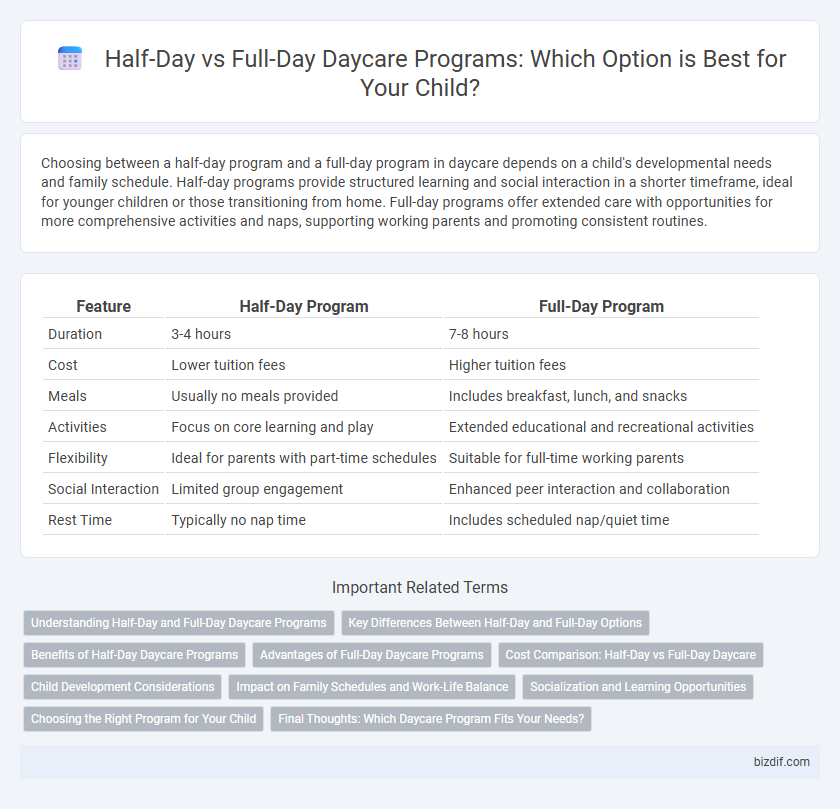Choosing between a half-day program and a full-day program in daycare depends on a child's developmental needs and family schedule. Half-day programs provide structured learning and social interaction in a shorter timeframe, ideal for younger children or those transitioning from home. Full-day programs offer extended care with opportunities for more comprehensive activities and naps, supporting working parents and promoting consistent routines.
Table of Comparison
| Feature | Half-Day Program | Full-Day Program |
|---|---|---|
| Duration | 3-4 hours | 7-8 hours |
| Cost | Lower tuition fees | Higher tuition fees |
| Meals | Usually no meals provided | Includes breakfast, lunch, and snacks |
| Activities | Focus on core learning and play | Extended educational and recreational activities |
| Flexibility | Ideal for parents with part-time schedules | Suitable for full-time working parents |
| Social Interaction | Limited group engagement | Enhanced peer interaction and collaboration |
| Rest Time | Typically no nap time | Includes scheduled nap/quiet time |
Understanding Half-Day and Full-Day Daycare Programs
Half-day daycare programs typically run for three to four hours and focus on early childhood activities, socialization, and basic learning skills suitable for younger children or those with shorter daily schedules. Full-day daycare programs extend from six to twelve hours, offering comprehensive care that includes structured educational activities, meals, naps, and playtime, which supports working parents needing all-day supervision. Understanding these distinctions helps parents select a program aligning with their child's developmental needs and family routines.
Key Differences Between Half-Day and Full-Day Options
Half-day daycare programs typically last around 3 to 4 hours, providing young children with focused learning and playtime, while full-day programs extend to 8 to 10 hours, accommodating working parents' schedules and offering more comprehensive care. Full-day options often include meals, naps, and a broader range of activities promoting social, cognitive, and motor skills development, whereas half-day programs concentrate on core educational experiences with limited structured downtime. Cost differences are significant, with full-day programs generally costing nearly double the half-day rates due to extended supervision and additional services.
Benefits of Half-Day Daycare Programs
Half-day daycare programs provide young children with structured learning and socialization opportunities while allowing ample time for rest and family interaction at home. These programs often support developmental milestones through focused activities tailored to shorter attention spans, promoting cognitive and emotional growth without overwhelming the child. Families benefit from flexible scheduling and reduced costs compared to full-day attendance, making half-day options a practical choice for many parents.
Advantages of Full-Day Daycare Programs
Full-day daycare programs offer extended hours that better accommodate working parents' schedules, providing consistent care and structured activities throughout the day. These programs support children's social development and learning by allowing more time for interactive play, educational lessons, and rest periods. Access to nutritious meals and professional supervision ensures a safe and nurturing environment that promotes overall well-being and early childhood growth.
Cost Comparison: Half-Day vs Full-Day Daycare
Half-day daycare programs generally cost 30-50% less than full-day programs, making them a more budget-friendly option for families with flexible schedules. Full-day programs provide extended care, often including meals and enrichment activities, which contribute to the higher price point averaging between $50 to $100 per day depending on location. Choosing between half-day and full-day daycare depends largely on childcare needs and financial considerations, with half-day options reducing expenses while full-day care offers comprehensive support for working parents.
Child Development Considerations
Half-day daycare programs support early childhood development by providing structured learning and social interaction while allowing ample rest and unstructured playtime at home. Full-day programs offer extended opportunities for skill-building, emotional learning, and peer engagement but may require careful attention to prevent caregiver fatigue and promote balance. Choosing between half-day and full-day schedules depends on the child's temperament, developmental needs, and family routines to optimize cognitive and social growth.
Impact on Family Schedules and Work-Life Balance
Half-day daycare programs offer greater flexibility for parents with part-time work or variable schedules, reducing daycare costs and allowing more direct family interaction during afternoons. Full-day programs provide consistent coverage that supports full-time employment, enabling parents to maintain steady work hours and reduce childcare-related stress. Choosing between half-day and full-day daycare significantly influences family routines, child engagement, and overall work-life balance.
Socialization and Learning Opportunities
Half-day daycare programs provide focused socialization opportunities in smaller, structured settings, promoting early peer interaction and basic skill development. Full-day programs offer extended learning experiences with varied activities that enhance cognitive growth and sustained social engagement throughout the day. Both programs support socialization, but full-day schedules maximize learning potential and relationship-building among children.
Choosing the Right Program for Your Child
Selecting between a half-day and full-day daycare program depends on your child's developmental needs and family schedule. Half-day programs often emphasize socialization and structured activities, ideal for younger children or those requiring limited care hours. Full-day programs provide extended learning opportunities and consistent routines, beneficial for working parents seeking comprehensive care and early education.
Final Thoughts: Which Daycare Program Fits Your Needs?
Choosing between a half-day and full-day daycare program depends on your child's developmental needs and your family's schedule. Half-day programs often emphasize structured activities and socialization in a shorter timeframe, ideal for younger children or those adjusting to group settings. Full-day programs provide extended care and comprehensive learning opportunities, suited for working parents requiring consistent childcare throughout the day.
Half-day program vs full-day program Infographic

 bizdif.com
bizdif.com